Customize your purchase
The choice is yours. Add 1% to 100% RNG to your purchase profile. Here are a few examples of the potential impacts for a medium-sized home of about 160 m2 heated with natural gas.
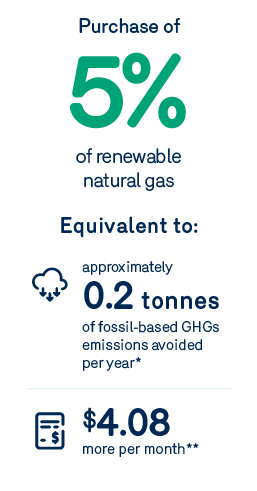
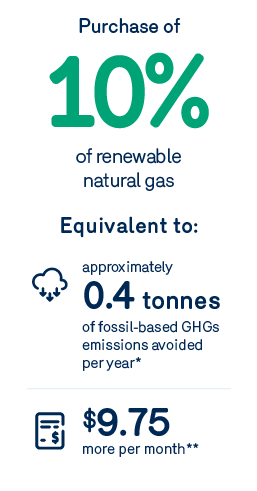
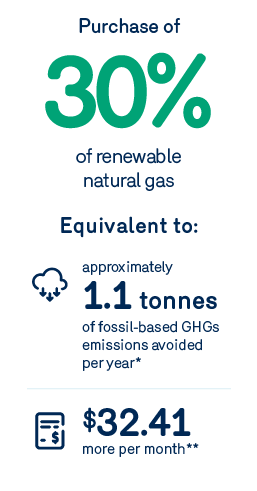
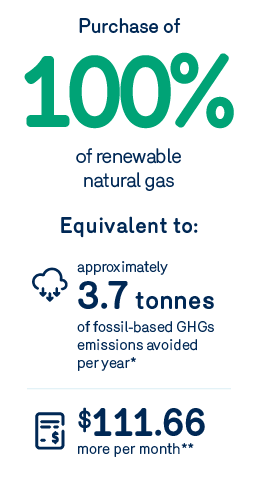
Before finalizing your choice, take a moment to explore Understanding my purchase section.
How do you choose your percentage?
Use the Customer Space to estimate the impact of different RNG percentages on your personal consumption, with no obligation on your part.
Log in to the Customer space. If you don't have an account, choose the "Create my account" option.
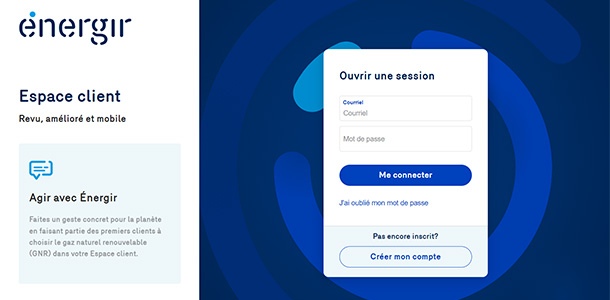
On the home page, click on 'Open the Renewable Natural Gas Space'. If you have more than one account, select the one you want first.
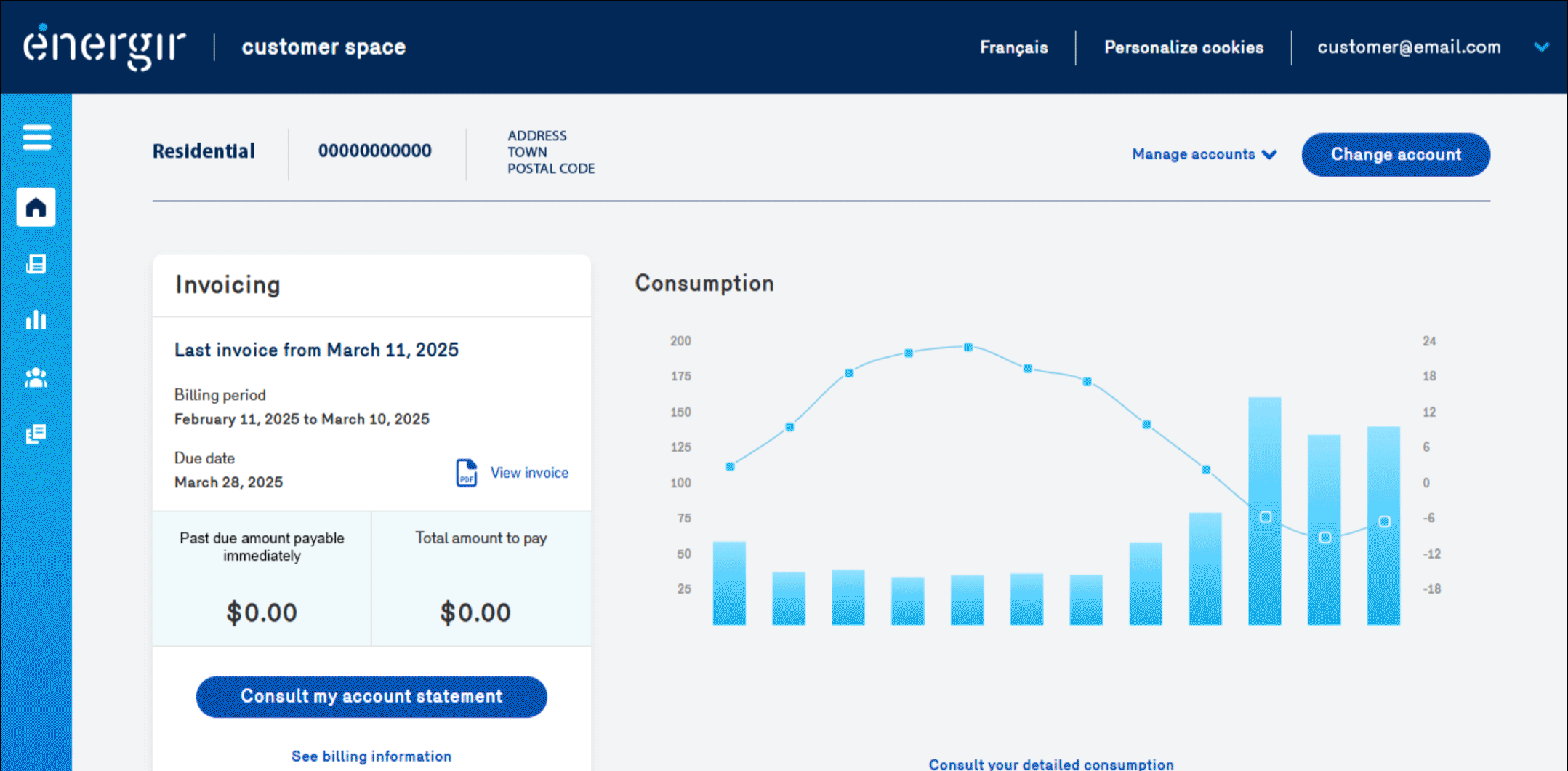
Click the "Create" option next to the relevant address.
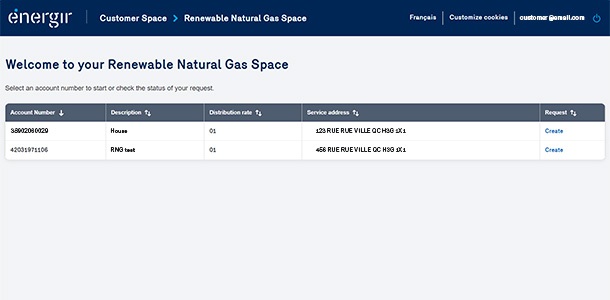
Move the cursor to determine the quantity of RNG and compare the effects on your monthly bill and on the environment.
To find out more about RNG's GHG emissions, see our frequently asked questions.
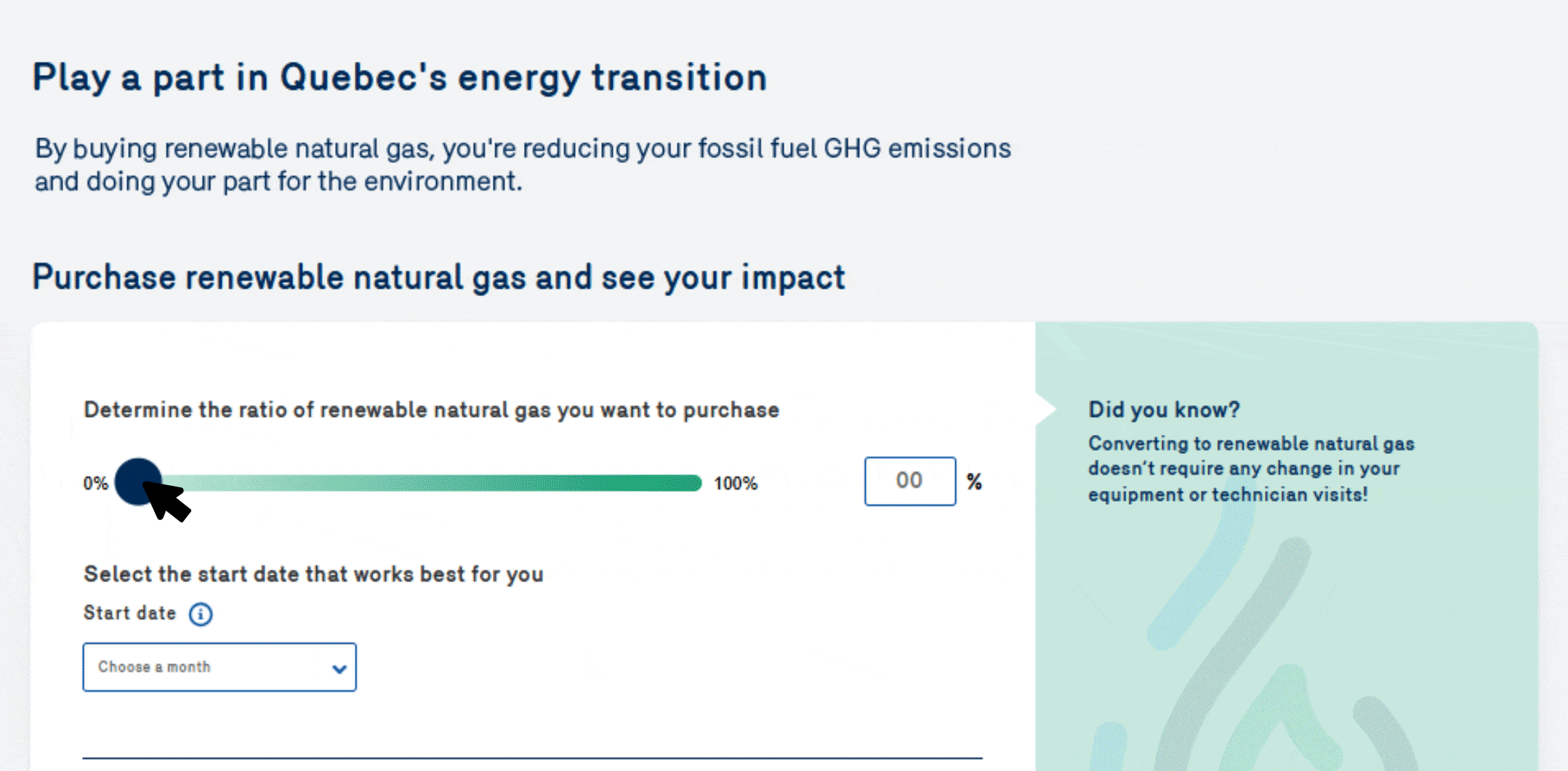
Enter the desired percentage and effective date. Then click on the “Submit my request” button.

Ready to make a 5-year commitment?
You may be eligible for a grant.
Contact us for more information on available amounts and applicable conditions.
Renewable natural gas on your bill
The supply rate for RNG is set annually as part of the Rate Case filed each year with the Régie de l'énergie. Note that there is no charge related to the Cap and Trade Emission Allowances Service for RNG.
You'll find the cost associated with your purchase percentage in the Calculation of the Amount Billed section of your invoice, as in this billing example.

Questions?
We've got answers.
You can request a change to your renewable natural gas purchase at any time. As a customer, for an effective date of the first of the following month, you must submit your request no later than the 20th of the current month. Requests received after the 20th of the month will be processed with the following month’s requests. The change request is made directly in your Customer Space by specifying the revised purchase percentage and desired effective date.
There is no way to exactly confirm the amount of RNG that is delivered to your devices, since RNG and fossil natural gas use through the same gas network. So the molecules mix together and are not separable. The same applies to electricity that is consumed: you can’t tell which dam or wind turbine the electrons that are lighting your home come from.
The quantity that is voluntarily purchased by a customer differs from the quantity that is physically transported to the customer’s devices.
Énergir has put in place rigorous measures at regular intervals to ensure that its total supply on an annual basis from RNG producers, as a replacement for the fossil natural gas molecule, is at least equal to the quantity purchased by all its customers. Following the end of a given year, Énergir has its RNG supply and inventory verified annually by the Bureau de normalisation du Québec (BNQ).
Your purchased RNG volumes are shown on your detailed bills for total natural gas consumption.
To meet regulatory targets for RNG deliveries, Energir sources most of its RNG from producers in North America. It is working to increase its supply from producers in Quebec. The quantity of RNG purchased by Energir from each producer is injected by the latter into the gas network of the region where the producer is located. It can therefore be injected into the gas network of Energir or another distributor in North America, and then mixed with the fossil natural gas circulating in the same gas network. The gas molecule or electron is consumed by the various users connected to these networks. The quantity of RNG purchased by Énergir reduces the quantity of fossil natural gas that Énergir buys as part of its overall supply.
To find out more, see the question "What confirms that my RNG purchase is correctly applied to my home?”
RNG combustion is not emission-free; it generates GHG emissions (CO2, CH4 and N2O) in the same way as the combustion of fossil natural gas. CO2 is the main GHG that is generated (over 99% of combustion emissions). However, unlike the emissions resulting from the combustion of fossil natural gas, CO2 emissions from RNG combustion are not included in emissions targeted by the fight against climate change. Fossil natural gas combustion releases CO2 that has been sequestered for millions of years in geological formations. In contrast, the CO2 released into the atmosphere from RNG combustion (known as biogenic CO2) was sequestered in organic matter (food waste, manure, wastewater, etc.) that renews much more rapidly. Biogenic CO2 was therefore in the atmosphere not so long ago, was absorbed by organic matter, and will be re-absorbed. The effect of biogenic CO2 on the climate depends on a variety of factors, including the source of organic waste.
Énergir has a regulatory obligation to deliver a minimum amount of RNG during its fiscal year (2% in 2023-2024, 5% in 2025-2026 and 10% in 2030-2031). If customers do not voluntarily purchase a portion of that RNG, Énergir has to socialize the cost of the unsold volumes among customers who do not purchase the minimum quantity required by regulations. Thus, if demand from voluntary customers does not exceed the regulatory threshold regarding the quantity of RNG to be delivered, voluntary purchases will not impact the reduction of GHG emissions in Québec attributable to RNG. Conversely, if voluntary purchases exceed that regulatory threshold, they enable a further reduction of GHG emissions from RNG with respect to Québec.
It is a charge that spreads the costs associated with the volume of RNG to meet the regulatory obligation and that is unsold among customers likely to make purchases. Energir has a regulatory obligation to deliver a certain amount of RNG in its system. When a portion of this RNG is not voluntarily purchased by its customers, Énergir must socialize the cost of the unsold volumes among customers who have not purchased the quantity of RNG from the regulatory threshold (i.e., 2% in 2023-2024, 5% in 2025-2026 and 10% in 2030-2031).
We're here to help
If you have any questions about renewable natural gas or the application process,
please contact our Customer Service team.
1. A 160 m2 home consumes approximately 1955 m3 of natural gas annually.
*For more information on the methodology used to calculate greenhouse gas (GHG) emissions reduction data, see our methodology page.
**Based on the heating and domestic hot water consumption of an average home (about 160 m2), at the current rate.


